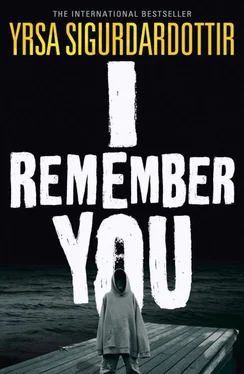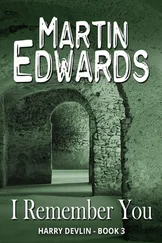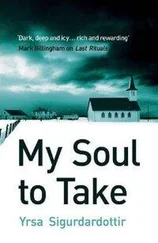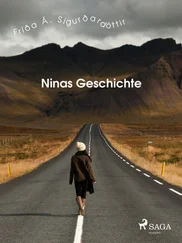And although Líf hadn’t said anything to suggest that she’d played a part in Einar’s death, she didn’t have to. Einar had left her, doubtless after arranging things so that most of their money would remain with him and Líf would be left empty-handed. Not to mention the humiliation of the situation. Katrín knew Líf well enough now to realize that she would never have accepted such a thing. So Einar had had to go, and somehow she’d made it happen. Katrín simply knew it; in the same way that she didn’t need to be told that it was dangerous to stand too near the edge of a cliff, it was perfectly clear to her that the same went for Líf. A person who seemed unable to repent or to express regret for their actions was much less predictable than the edge of a cliff, which could easily be avoided by keeping a safe distance. But a safe distance from Líf wasn’t an option here. Katrín promised herself that she would never, never, ever again be under the same roof as this woman, if they made it safely back to Reykjavík. Never.
Neither of them said anything for a while. In the meantime it continued to grow colder. Their breath ascended frostily from their lips and Katrín felt that she didn’t have as much control over her fingers as usual. She pulled her sleeves over her hands in the hope of keeping them warmer, without producing the desired result.
‘What is that in the basement?’ Líf stared at her, and no matter how much Katrín wanted to look away, she couldn’t help but meet her eyes. But she didn’t answer. Líf persisted anyway: ‘You can see a bag in the photo. An old-fashioned schoolbag.’ She leaned forward conspiratorially and whispered, as if they were trusted friends sharing secrets: ‘And there are seashells all over the place.’
Katrín said nothing, but turned away from her and rested her head on her knees again. She had no idea what bones were down there, but she couldn’t rule out the idea that they might belong to the boy they’d seen. It seemed to her that the material partially covering the bones resembled the jacket the boy was wearing when he appeared to them.
‘It’s probably the ghost, Katrín. His bones. It looks to me as if he’s missing some fingers on one hand, so I suppose the fox under the porch got to the body and the ghost killed it to take revenge for the loss of its fingers.’ It was as if Líf had already forgotten their conflict. Katrín couldn’t see her face, but she was speaking as if nothing had happened; no doubt Líf had grown tired of Katrín’s attitude and was determined to pretend everything was the same as before. ‘Maybe he’ll disappear now that we’ve opened up the floor. I’m sure that was what he wanted the whole time – for us to find the bones. Maybe that’s why he killed the previous owner; he accidentally blocked the hatch, making the likelihood of the bones being found almost non-existent. We’ve fixed the problem, so everything should be all right now.’ Líf hadn’t actually had a hand in any of it, but naturally claimed a share of the credit. ‘I hope so, anyway,’ she whispered.
Katrín felt as if she were in a dream, or rather a nightmare. She didn’t look up, but spoke into her knees. ‘Why were you messing around with this house at all? Why didn’t Garðar just leave me for you, without dragging me into this madness? You have all Einar’s money now. I don’t understand you two. Was Garðar just as crazy as you?’ Líf muttered something that Katrín didn’t hear properly. She didn’t ask her to repeat herself, however; the little she’d understood was enough. ‘Ah, you didn’t want Garðar with all his debts? Is that what you’re saying? Despite your having so much money you wouldn’t have to lift a finger for the rest of your life?’
‘I’m not going to pay someone else’s debts. It isn’t fair.’ Líf was clearly a great proponent of fairness where it concerned her. Unfairness was for other people, in her world. ‘It was Garðar’s idea and I tried to dissuade him. That’s why I came along, to stop him.’
‘Stop him from what?’ Katrín pressed her face so tightly against her knees that her closed eyes hurt.
‘From hurting you. Killing you, actually. He was the one who pushed the wall onto you. He’d already set it up. He just needed to tug on the rope that was there and… Boom!’ Líf sighed. ‘I tried to prevent it but I couldn’t. Maybe it’s for the best that he disappeared.’
Katrín said nothing, just let the tears flow; they didn’t fall, but soaked into her trousers. She wasn’t sure whether they were tears of anger or sorrow. She cleared her throat to get rid of the lump in it; she couldn’t bear the idea of Líf knowing she was crying. ‘What’s wrong with you?’ Garðar wouldn’t have been better off with her dead; if they’d divorced, he would only have been responsible for half of their debts, but as a widower he would have been left with all of them. Then she remembered their life insurance. The money that was supposed to ensure that if one of them died, the other wouldn’t need to struggle with financial difficulties on top of everything else, or their parents if they both died at the same time. What a joke. ‘You slammed that door into me. Didn’t you?’ Líf didn’t need to answer this; her embarrassed look was proof enough. Katrín was sure her sick mind was racing to find a way to explain this, probably by saying that Garðar had forced her into it. She didn’t want to hear it. ‘Did you kill Einar, Líf? Maybe Garðar as well?’
‘No, how could you think that? I was telling you that I tried to stop Garðar. I tried to save you. We’re friends.’
Nausea overwhelmed Katrín. How could Líf think that she didn’t remember how the collapse of the brick wall had occurred? It was Líf who had urged her to peek in through the opening in the wall, and wouldn’t take no for an answer. If Garðar had pushed down the wall it had been with Líf’s full support and probably her encouragement. And when Katrín fell down the stairs, no one but Líf had been standing behind the door. ‘Liar.’ Katrín didn’t dare say more. The tremendous rage that had been keeping her going was diminishing rapidly, to be replaced by sorrow at her situation, the betrayal and the injustice. Adding in the pain in her foot and the biting cold, it all became a perfect cocktail of grief and misery. Katrín had never felt so powerless.
‘I’ll pretend you never said that.’ Líf’s teeth were chattering. ‘In the morning, after we’ve slept a little, everything will be better. Believe me, I can feel it. We’ve hit rock bottom and now the only way is up. The boat’s coming tomorrow and everything will be just like it was. Well, almost.’ She looked at the tattered cigarette packet on the table. ‘I’m thinking of smoking the last cigarette. I know you can’t come with me to the doorway, but I should be all right since everything’s gone quiet and the scary stuff seems to have stopped now.’ As if on cue, a creak came from a door hinge upstairs. Startled, they both stared wide-eyed at the ceiling, which revealed nothing. The creak came again, as if a door were opening slowly but surely. Then it was slammed with so much force that Katrín half expected to hear it fall to the floor. But this didn’t happen; instead they heard a malevolent chuckling and then the footsteps of someone running down the hallway. The ceiling trembled and loose flakes of paint fell onto the kitchen table and the packet of cigarettes.
Líf grabbed her chest. ‘He’s upstairs.’ As soon as she said this, a loud knocking came from the crawl space below. Katrín was so startled that her neck cricked painfully as she looked down. Adrenalin rushed through her veins and the pain in her fingers disappeared. Even her foot seemed to benefit from the shock, since the throbbing lessened, though without disappearing completely. Líf stared wide-eyed at Katrín. The knocking came again, now slightly softer, followed by a noise as if something were being dragged along the floor beneath them towards the opening. Neither Katrín nor Líf dared so much as breathe, and Putti made no sound. The noise grew clearer the closer it came and was accompanied by a vague mumbling that was impossible to make out. Katrín drew a deep breath and looked towards the window; her only thought was to get out of there and that was the shortest way out. She recoiled in horror, feeling hope drain away, for outside stood a boy who didn’t seem to be the same one they had seen before. This one, who was smaller, stared in with glazed eyes, his greyish face infinitely sad. Outside or inside. It didn’t matter. They were dead.
Читать дальше










